A Brush With History
Diane Speare Triant writer
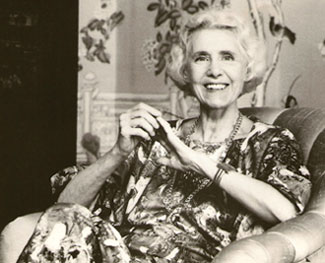
Clare Boothe Luce
Have you ever had an experience with someone truly noteworthy or famous? Were you seated at a dinner with a head of state? Did you know someone at college like Bill Gates? Or perhaps you were present at a significant moment in history: New York on 9/11, the Kent State riots.
We asked local residents to share any such encounters with us for this story. We hoped for a substantial interaction that would open a window on a notable figure’s personality or offer insight into his or her life, or perhaps provide a fresh detail from a historical event.
Why did we think such a story worth pursuing? Beyond the obvious “human interest” angle, in this age of information, any addition to the archival record of high-profile people or events is considered valuable. Our neighbors and colleagues just might be in possession of unique primary source material. The responses were both enlightening and entertaining.
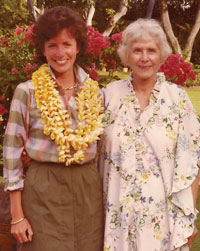
Margaret Boles Fitzgerald with her great-aunt, Clare Boothe Luce
Historic Moments
Alice Robinson of Wellesley, Professor of History, emerita, at Wellesley College, recalls a moment 70 years ago: “The only encounter with history I ever had was brief and confined to my family. I happened to be reading on my bed – reading, with the radio on – when FDR announced the attack on Pearl Harbor, December 7, 1941, and said it was ‘a date that would live in infamy.’”
Robinson’s concise statement conveys more than she might think. The cozy scenario of a young woman reading in bed with the radio playing in the background is symbolic of a nation feeling secure and safe, unaware of the impending inferno that would mint “The Greatest Generation.”
Fittingly, Jean Canellos of Weston, a former admissions counselor at Wellesley College, focused on the end of World War II, providing a bookmark to Robinson’s recollections:
“The war in Japan is over! Victory was announced on the radio by President Truman on August 14, 1945 at around 7:00 p.m. After dinner at our rented cottage in Hyannis, my father had turned on the radio to hear the news from the front lines. This amazing declaration interrupted the broadcast. We headed for Main Street, the place where restaurants had for years seen lines of soldiers from Camp Edwards stretching for blocks, and where “Peg O’ My Heart” wafted from juke boxes. The streets were jammed with people screeching for joy and embracing. Doors of restaurants were thrown open, music rose to deafening levels, and drinks abounded.
“For a child like me, war had meant air-raid drills in school, where we lay on the cellar floor face down; houses and headlights outfitted with black-out shades and paint to obscure city lights from possible enemy aircraft; and my beloved stuffed Easter bunny, which I had named General MacArthur.
When VJ Day arrived with its heart-pounding intensity, it remained a night indelibly etched in my brain as an explosion of happiness unequaled in the 66 years since.”
Fascinating Lady
She was a playwright, editor of Vanity Fair, wife of America’s most powerful publisher, and ambassador to Italy. She was also the great-aunt of Wellesley’s Margaret Boles Fitzgerald, who, in the early 1980s, traveled to Honolulu for a two-week visit with her “auntie” Clare Boothe Luce. Fitzgerald, who now chairs the Henry Luce Foundation, describes Luce as “an ‘original,’ a creative thinker, a strong woman in a stronger man’s world, determined to be noticed and heard.”
As an octogenarian, Luce chose to focus much of her grand-niece’s visit on religion. “Most endearing was her colorful construct of her conversion from a cultural Protestant to a fervent Catholic (she, who married the son of Presbyterian missionaries!),” Fitzgerald writes of Luce. “The embers stirred, surely, after the death of her only child – a daughter who died in a car accident. But she tiptoed through her grief with no sure solace until a childhood friend, who had just ‘worked through’ her entry in the Catholic faith, suggested she place herself in the capable tutelage of the legendary Fulton Sheen … She threw herself into the rigors of knowing both the manners and the scriptural context of Catholicism. When I asked her why Catholic and not a, say, renewed Presbyterian, she said she wanted to ‘begin at the beginning.’”
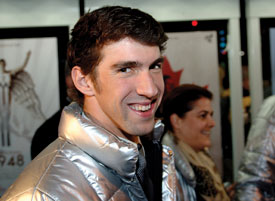
Michael Phelps
Luce also instructed her youthful visitor “to be jealous only of the woman who stirs a fire in a man through keen intelligence and a strongly constructed argument.” Fittingly, this irrepressible powerhouse kept a sign above her office door reading “Do Not Let Clare Boothe Luce.”
The Athlete
“I was a spectator at the Beijing Olympics in 2008,” reports Walter Downing of Wellesley. “In a chance meeting with Michael Phelps, winner of eight gold medals in swimming, I asked Michael this question: ‘Why, after all this unprecedented success, do you want to compete in the future London Olympics? Is there anything left to prove?’ Michael’s answer: ‘Walter, in all honesty I am just learning how to swim.’ (He was serious.) Perfection is an endless chase.”
Pop Idols
Radio personality and Wellesley resident Candy O’Terry is MAGIC 106.7’s on-air co-host of Exceptional Women. In this capacity, she sat for an hour interviewing multiple-Grammy winner and pop singer Mariah Carey in her Four Seasons Hotel suite. “Mariah’s bodyguard was as big as a kitchen table,” says O’Terry. “She told me how she always knew she was different, that she was bound for greatness, that she was driven to do this. She told me she first sang Rigoletto at age three. When her mother, Patricia Carey, was practicing the song, she stopped her and said, ‘No, Momma…it goes like this’…and sang every note!”
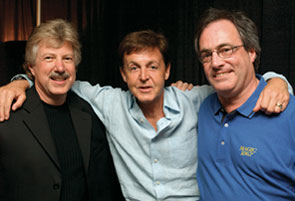
Magic 106.7 morning show host Mike Addams, Paul McCartney, and Don Kelley
By contrast, country/folk singer and songwriter Mary Chapin Carpenter’s early aspirations were limited to informal jamming and appearing at local bars. At Brown University, she was a suitemate for two years with Wellesley resident and writer Liz Suneby. “We all called her Chapin, and I can’t remember her doing many, if any, public performances,” Suneby says. “She was shy. We lived in a big old house near campus, with Chapin’s small room tucked under the eaves on the third floor. She was often playing her guitar and singing up there, with her musical friends coming and going; so the eight of us living in the house were often treated to ‘private’ concerts when we left our door ajar … Chapin has a quick wit; I cannot carry a tune, not even slightly. So when we would sing “Happy Birthday” to a suitemate at dinner, she’d suggest that I mouth the words!”
In 2002, Wellesley’s Don Kelley, Vice President and Director of Programming at MAGIC 106.7, sat on a couch with Beatles legend Paul McCartney in the Fleet Center’s backstage green room. “My radio station was the only one invited,” Kelley says. “Paul’s tour manager, named Freundlich (that’s German for ‘friendly’…but he wasn’t), said we’d only get five minutes with Paul. Only the morning show host and I would be allowed in. No pictures, and don’t mention his late wife Linda. A moment later, Paul entered the room and couldn’t have been nicer. We talked for a half-hour, he brought up the subject of Linda, posed for pictures and asked if our wives had come with us, and would they like to come in and say hello.”
By contrast, a disheveled Rod Stewart – when asked to blow out the cake candles at the same station’s 25th birthday party – offered a “why me?” pout. “I told him that I had checked the airplay history and that we’d spun Rod Stewart songs 53,000 times,” says Kelley. “He blew out the candles.”
Politicians
In 1995, Robert McNamara – Secretary of Defense under Kennedy and Johnson and largely considered the architect of the Vietnam War – came to Boston as an octogenarian to promote his book, In Retrospect: The Tragedy and Lessons of Vietnam. Wellesley resident Gina Wickwire, working as a media escort, was assigned to drive McNamara to the JFK Library.
“I had quite an adventure with him,” says Wickwire. “But most importantly, I changed my ’60s anti-war attitude toward him and what he had represented to much of our generation during those Vietnam years.
“When I thought of Robert McNamara I thought of those black and white images of the tight-lipped Secretary of Defense with the rimless glasses and slick ‘Dagwood Bumstead’ hair. The man I met was colorful, energetic, and exuded an enthusiasm for life that was unexpected. He relished his chance to meet people and talk about his book. He expected criticism for what some were calling ‘his apology for the Vietnam War,’ and he met it head on. I was impressed with his command of the facts and the courage of his convictions. He could have kept silent about his role in a very difficult time in our history, but chose to examine, at the risk of strong disapprobation, what went wrong and what lessons could be learned.”
When former Dean of Wellesley College Maud Chaplin was a Wellesley College student herself, a quaint tradition existed: the Sophomore Fathers’ Weekend and Dance. When Chaplin’s father declined to come because “it was not his kind of event,” her roommate quickly offered to have her father double up. And so it was that U.S. Vice-President-to-be Nelson Rockefeller – then an advisor to President Eisenhower – came to Wellesley. “He included me in every aspect of the weekend,” recalls Chaplin. “He acted as if he were my loving and proud father, and instantly dispelled any awkwardness I might have felt.”

Beth Hinchliffe with President George H.W. Bush, First Lady Barbara Bush, and Bob Hinchliffe.
Rockefeller asked Chaplin to accompany him to a Central Street florist, as he wished to purchase corsages. When they arrived, no shop-person was in sight. Two women hurriedly entered the store and, to Chaplin’s astonishment, assumed that Rockefeller worked there. “We need a centerpiece for a dinner party tonight,” one of them said; “something in soft pastels.” Rockefeller did not miss his cue. “Of course,” he replied, “something in lavender, very elegant, perhaps complemented by some lily of the valley, in season now, with a very soft scent that will help set the mood.” He proceeded to select and arrange the blooms, even suggesting an appropriate vase. “When the florist emerged from the rear of the shop,” says Chaplin, “he bewilderedly exclaimed that he would hire ‘such a knowledgeable helper’ at any time.”
Wellesley Town Historian Beth Hinchliffe came to know the inner George H.W. Bush as one of his presidential speech writers. “One day during the first Gulf War, I was working on a speech with President Bush in the Oval Office,” she writes. “We were sitting in the armchairs in front of the fireplace; I never saw him work behind his desk, he sat where his staff sat, so that we would feel comfortable. Suddenly he interrupted himself and looked over at me. ‘On the news last night, I saw an American soldier carrying a wounded Iraqi child,’ he said, tears coming to his eyes. ‘Can you find out what happened to the boy?’
“That was the man I was privileged to serve: both a gentleman and a gentle man, someone of caring and profound empathy. His deeply felt emotions were so close to the surface that I learned to avoid putting in his speeches any references that might make him choke up, like the time I’d written a subtle reference to his daughter who died young, and he couldn’t finish.
“My favorite memory of him showcases his good heart. When he heard that my Dad was ill a couple of years ago, he immediately wrote him a warm letter, promising to remember him in his prayers. It was an honor to work for George Bush as President, and an even greater honor to know him as a man.”
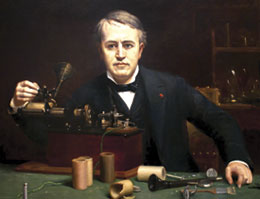 An American Icon
An American Icon
Perhaps the most interesting encounter of all belongs to the late Florence Kern, a Wellesley College alumna. Shortly before her death, she revealed that in her first job as a fledgling reporter, she interviewed Thomas Edison at the dawn of the television age. “I asked him whether or not this new invention had any future,” she recalled. “He said he thought it did.” bug
If you’ve had an experience with someone noteworthy or famous, we’d love to hear from you. Please e-mail jill@wellesleywestonmagazine.com.
Diane Speare Triant, a writer in Wellesley Hills, as a young girl met
presidential-candidate John F. Kennedy in Hyannisport while strolling by his compound with her father. Kennedy’s helicopter had just landed and he came across the lawn to shake hands over a white split-rail fence [now replaced with an eight-foot-high solid one]. The meeting was unremarkable, save for one aspect: the total openness of the encounter. Kennedy was free to interact as one might with a next-door neighbor. In retrospect, how might history have evolved very differently had he enjoyed the security standards of today?

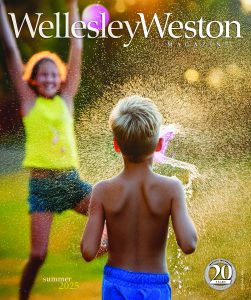
recent comments